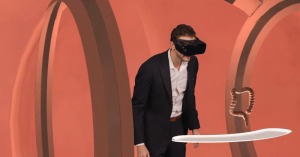From the January/February 2018 issue of HealthCare Business News magazine
By Dr. Jon Ernstoff
Virtual reality, or VR, is a fascinating technology that can take you into a three-dimensional world of imagination.
For years, this computer technology has stimulated the senses to create an illusion of reality. Its primary focus was in the entertainment world. Recently, it has found a growing niche in health care with more applications targeting new aspects of the industry ranging from education to exciting clinical applications.
Medical VR technologies are exploring new therapeutic areas and helping to accelerate recovery in post-stroke patients as well as aiding those in the military suffering from post traumatic stress disorder or PTSD. This is an exciting interaction of new technology in the health care environment.
As a practicing gastroenterologist, medical VR caught my attention as a potential means for better educating my patients.
Every GI’s challenge: The colonoscopy
For GIs, performing colonoscopies for the prevention and detection of colorectal cancer, the second-leading cause of cancer deaths in the U.S., is one of the primary focuses of our field. For the 15 million colonoscopies performed in the U.S. annually, up to one-third of patients who have the procedure performed will have an inadequate bowel preparation or incomplete emptying of the bowel prior to the screening. This is frequently due to a lack of understanding of the importance of the prep, and in some cases, an actual fear of bowel preparation itself. Ideally, every patient would meet with the endoscopist to review the nature of the colonoscopy and the preparation involved. But, unfortunately, the climate in health care does not always allow for this.
Unlike many other medical procedures, colonoscopies are heavily dependent on patient compliance often for days prior to the procedure. This is key to a successful screening where optimal visibility of polyps and lesions is necessary.
On the day of the colonoscopy, it is not until we actually perform the procedure that we can determine how well the patient actually understood and followed the directions for the bowel preparation. And, after any unsuccessful procedure, we as professionals are left wondering how to improve the patients’ understanding of the process to help us better help them.
